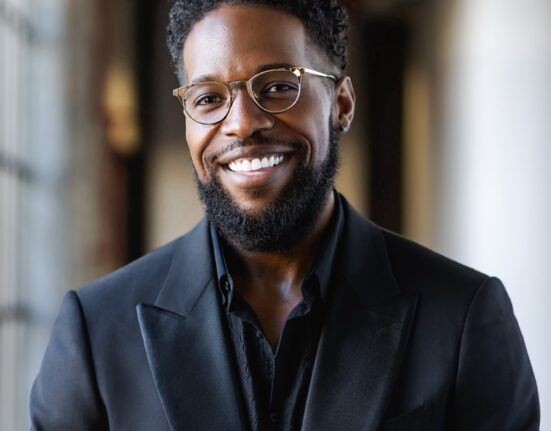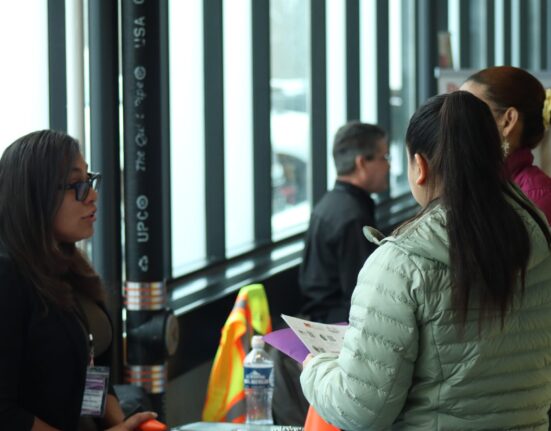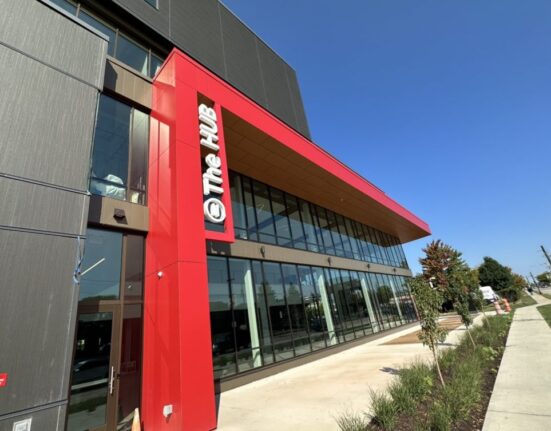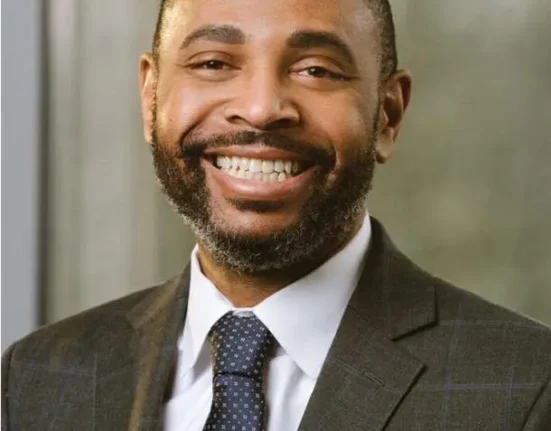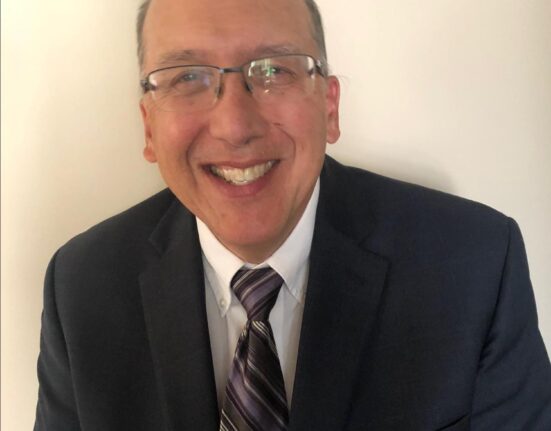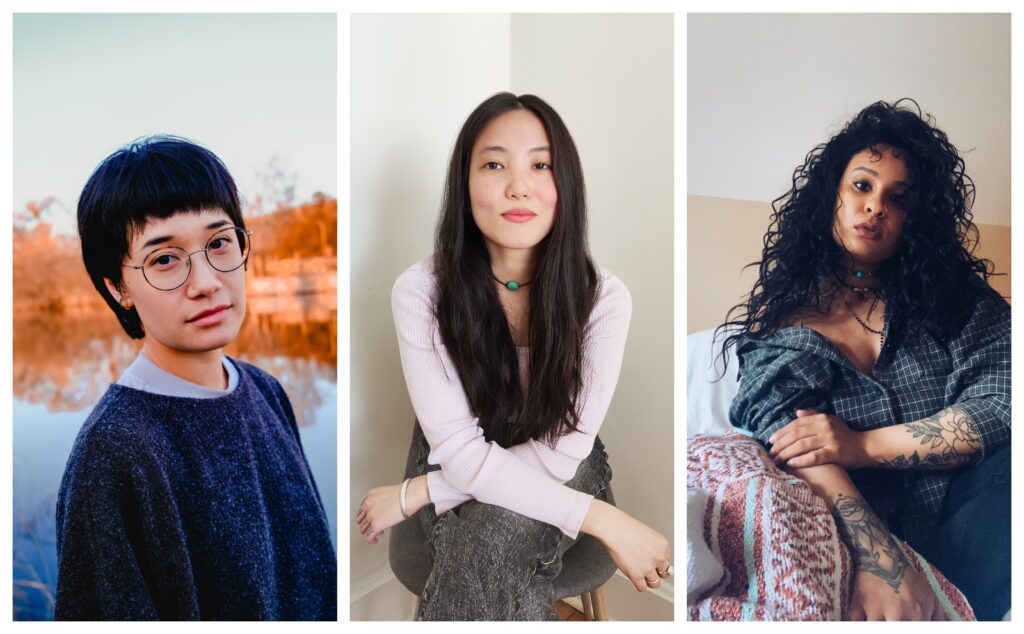
“I’m sorry if I’m nervous,” Meg Kim said to the room with a laugh, “I don’t do this very often.” Her audience, an encouraging group of just under 20 people at Chicago’s PO Box Collective, accepted her apology with grace. She then embarked on a brief four-poem set, the muggy Saturday air wafting in through the open door, enchanting the crowd with pieces on identity, landscape, and love. Some of the pieces will be featured in her forthcoming chapbook Invisible Cartographies, which is set to come out later this summer with New Delta Review.
That night, Kim, a 2023 graduate of UW-Madison’s MFA program, was an opening reader for poets Saba Keramati and Stephanie Choi, whose debut poetry collections Self-Mythology and The Lengest Neoi came out earlier in 2024. Once online acquaintances who became real-life friends a few years down the line, Keramati and Choi delivered a touching joint set of poems, highlighting moments where their respective works are most in conversation with one another.
These quiet, tender evenings are typical for early career writers, drawing crowds of mostly friends and family, with modest book sales to follow. Worlds away from glamorous launch parties and star-studded author readings of big literary scenes, the everyday lives of many creative writers are a lot more mundane, and contain a lot less fanfare.
However one finds themselves pursuing a career as a creative writer—whether full time or otherwise—the journey towards success and stability is an equally laborious and fruitful one.
Mentors and Masters: Finding A Way In
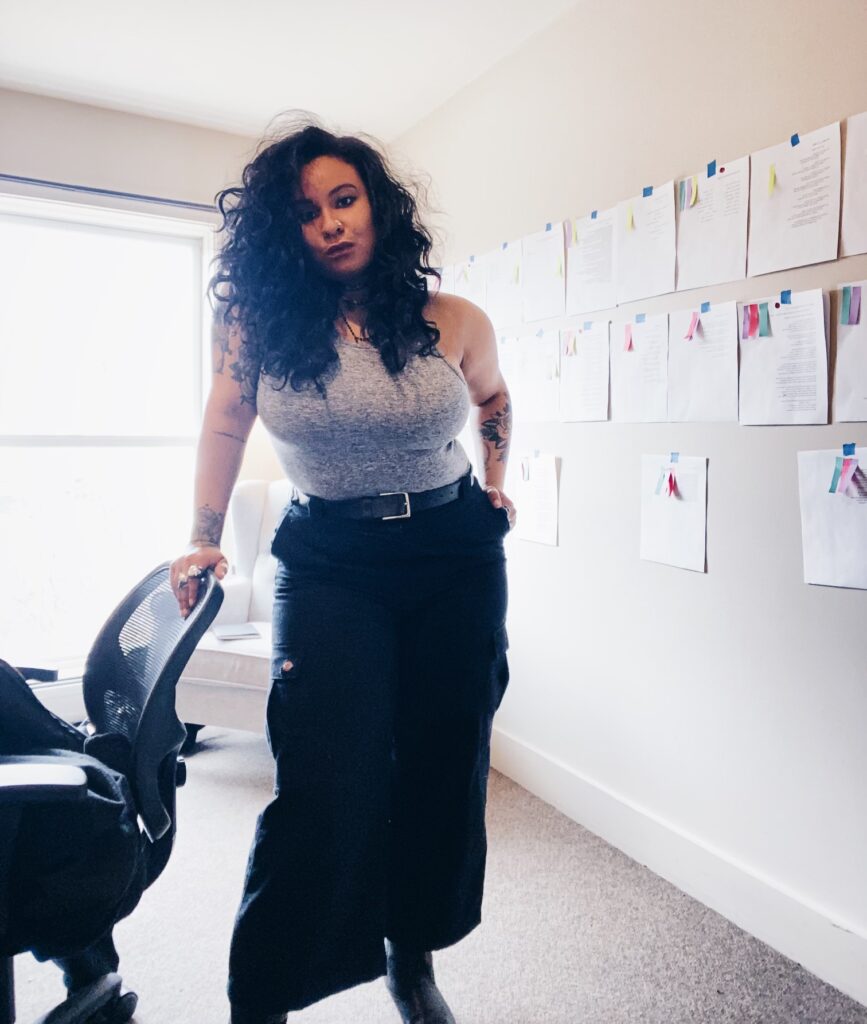
Natasha Oladokun came to Madison in 2018 by way of the UW-Madison First Wave Poetry Fellowship, of which she was the inaugural fellow. A poet and essayist from Virginia, she mentored UW undergraduate First Wave Scholars, helping them to develop a love of poetry by teaching workshops like “Weaponizing Tenderness,” which examined how love poems can be acts of protest.
In many ways, the spaces and opportunities Oladokun cultivated for her students mirror her own introduction to the form. She first fell in love with poetry as an undergraduate student at the University of Virginia, a place that connected her to mentors like Dave Lucas and John Casteen. Prior to being introduced to writing workshops by her roommate, she hadn’t even known contemporary poets existed—let alone led entire careers.
Without these mentors, Oladokun wouldn’t have made the decision to pursue poetry at the master’s level, which she knew was “the next important step” for her as a writer. “[Lucas] was one of the first people that I felt, [even though he] was coming to my work largely as a stranger, really understood what I was trying to do.”
Having mentor figures to help develop a budding interest into a more serious endeavor was also crucial to Kim’s trajectory as a poet. As a high school student, Kim competed in poetry recitation competitions through Poetry Out Loud, a national arts education program based out of the Poetry Foundation.
By the time college came around, she knew that poetry was what she wanted to pursue long term. “I didn’t really want to go to college at all, actually, unless I did that,” she said.
The intimate setting of her alma mater, Wheaton College, gave her the guidance she needed to really develop her craft. “[I got to] have a very thoughtful, close mentorship with my teaching advisor, who was also the first Asian American that I’d ever had as an educator,” she said. “That was really important and formative to me. She was super encouraging.”
This same kind of individualized mentorship was instrumental to Ada Zhang’s path towards becoming a writer. Zhang spent the 2023-24 academic year as the UW-Madison James C. McCreight Fiction Fellow. This past May, she rang in the first anniversary of her short story collection, The Sorrows of Others, in what she calls the “magic” quiet of Madison, away from the flashiness of New York City’s literary scene, where the book was launched.
Zhang’s first mentor at Baylor University was a fiction professor who helped her develop her skill in short story writing. In large part because of his guidance, Zhang didn’t feel pressure to go into an MFA program after graduating.
“He just already treated me like I was a writer,” she explained. “He was just like, “You’re a writer, and the only thing that you need to be a writer is to write. You don’t need an MFA.’”
It wouldn’t be until three years later, while working a job in publishing in New York, that Zhang would consider going back to school for fiction. She eventually got into and attended the prestigious Iowa Writers Workshop, but not before building a robust writing practice of her own. Over the course of those three years working full time, Zhang secretly and diligently worked on her short stories, her mentor’s advice powering her through months and months of drafts.
Writing in the Time of Corona: The Search for Stability
Like many people, Oladokun found herself in a precarious situation during the COVID-19 pandemic. Her fellowship at UW-Madison was ending, and she had to strategize her next steps. In the height of lockdown, as people found themselves with an unprecedented amount of “unstructured time,” she pursued various freelance teaching gigs, including those with Catapult, an independent publishing venture that at the time still had its online magazine and writing classes.
But as the world returned to “normal”—which Oladokun notes leaves disabled, elderly, and immunocompromised folks struggling to survive—and places like Catapult shuttered its classes or simply decreased in popularity, facilitating online writing workshops became a less stable source of income.
In recent years, Oladokun has been able to supplement these earnings with grants she’s been awarded for her writing: In 2022, she was the recipient of the Elizabeth George Foundation grant, and the following year, she received a grant from the National Endowment for the Arts (NEA).
But the realities of existing under capitalism pervade, and making ends meet still proves difficult: “I’m a single person. I live alone. I’m disabled. And so the kind of work that I’m able to do successfully and to do well needs to be work-from-home,” she explained. “So much of the world is structured to ignore folks who are alone, or folks who are unpartnered or unmarried.”
Oladokun also touched on how other aspects of her identity don’t afford her the same networks of support that others might lean on: “As a queer person, my familial life has changed quite a bit,” she said. “I’m not in touch with most of my relatives, and so that’s another area of support that is absent.”
For Kim, whose senior year of undergrad was spent in deep lockdown, the uncertainty of the pandemic pushed her to seek out a sense of stability in an increasingly unsettled world. As she was surprised to learn during her junior year of undergrad, an MFA could provide just that.
“I had just learned that there were programs that paid living stipends,” she explained. “I had kind of ruled it out [before]. If it was a degree I had to pay for, I wasn’t going to do it.”
That fall, she sent out applications with few expectations. She recalls treating that application as a “practice cycle,” fully expecting to do it all again the following year. To her surprise, she got into a number of programs, and ultimately chose to attend UW-Madison.
Ask a handful of writers about whether or not getting a Master of Fine Arts is worth the time—or in fact, is necessary to be a successful writer—and you’ll get varying answers. For Kim, it all depends on your end goal.
“I think the only reason in which someone pursuing writing as a profession really ever needs that degree is if they want to go the academic route [and] if they want to teach,” she said. “Other than that, I think it’s absolutely just a personal choice.”
From the friendships she forged to the classes she taught, Kim is most grateful for the time that the program afforded her to be able to focus on her work. “It really is so valuable to have [writing] be your job,” she explained. “It’s kind of like external validation to be told, ‘Actually, this is the most important thing you could be doing right now.’”
Being Market Savvy: Branding Yourself and Your Writing
Graduating from the MFA program in the spring of 2023, Kim has since moved back to the Chicagoland era, where she currently works in the nonprofit sector full-time. But she didn’t leave Madison without having her chapbook, Invisibile Cartographies, picked up by New Delta Review, a small press operating out of Louisiana State University.
Kim had spent the entire year prior tirelessly sending her chapbook manuscript out to publishers, and had all but given up when she heard back from New Delta Review. Chapbooks, which are much shorter than feature-length collections, serve as an entryway into the publishing world for many, most useful for its ability to put a title behind your name.
And while getting work published straight out of an MFA program is an unspoken goal for some writers, others choose to take a slower, less project-based approach to their work.
After graduating from Iowa in 2020, straight into the pandemic, Zhang continued chipping away at her short stories. While in the program, she refused to think of her pieces as making up a larger book. It wasn’t until three or four months after graduating that she put all she’d written—which includes stories she’d written from age 22 to 30—into one file and sent it to her agent.
“His reaction made me feel like, okay, this might be ready to go out,” she said. “[He was] my ideal reader.” Eventually, The Sorrows of Others would be acquired by A Public Space, an independent nonprofit publisher based in New York.
While in the process of developing their books, both Kim and Zhang considered themselves lucky in terms of the insider knowledge they had. Becoming the editor in chief of an online magazine in the the fall of 2022, Kim had grown familiar with the editorial side of putting a chapbook together.
“I’m honestly grateful that I had the experience of fumbling around in the dark, trying to figure out how to make a chapbook publishing process smooth for a writer,” she explained. “I’m also learning how to ask for what I need in my own publishing process.”
Despite this familiarity, Kim is still daunted by the marketing aspects of getting the word out about her upcoming book, especially in an online landscape that she feels is “oversaturated” with promotion.
“So much of however you want to measure success for your book—if you’re looking for a certain amount of readers or a certain amount of circulation—you just really do need to be a savvy marketer, and no one is really going to help you with that,” she said.
Her career in publishing allowed Zhang to rid herself of any rose-colored lenses early on when it came to promoting and touring with The Sorrows of Others. “The publishing industrial complex does exist,” she said. “If you’re very lucky and your book has been acquired and now it’s in the machine, you have to help turn the cogs. You are the major cog.”
To learn about how to succeed in marketing her book, Zhang enrolled in the Poets & Writers Publicity Incubator, a professional development program providing publicity advice to early-career authors. Under Lauren Cerand’s mentorship, Zhang learned a nugget of wisdom: Marketing her book didn’t have to all be driven by ego. It could also be inspired by a larger purpose.
“[Cerand] was so helpful because she was like, ‘Think about publicity as you helping the people who are looking for your book, find your book,’” she explained.
Cerand also encouraged incubator participants to find a larger purpose in their marketing. And so Zhang did just that: Almost immediately after The Sorrows of Others came out in May of 2023, Zhang embarked on a three-city book tour in her home state of Texas, where access to books continues to be threatened by state bans.
Like many book tours, Zhang’s was self-funded, powered by a rental car and a desire to deliver her book to readers. In Dallas, her reading at Interabang Books showed her the true power of community, and the good work that booksellers are doing in facing bans and other book-related restrictions.
Zhang noted how instrumental Interabang bookseller co-owner Lori Feathers is to cultivating a literary community in Dallas. “I benefited directly from that,” she said. “At my event, there were people there that were there not because of me, but because they know the bookstore and they know Lori.”
For Kim, the bonds formed outside of the stiff confines of the publishing industrial complex are what makes the dreadful parts of marketing her writing more tolerable: “I think being just a regular cheerleader for other people actually kind of lightens your own load,” she said. “Because they will return the favor. People are excited to do that for you.”
The Way Forward: Academic Job Markets and Fellowship-Hopping
The milestones that one can reach as a writer are as vast and varied as writers themselves. Ironically, while one of the most important things that writers need is time, the prospect of “what’s next” always seems to be around the corner.
Oladokun continues to teach online workshops, which keeps her skills—both educational and creative—sharp. “I’m a better writer when I’m teaching. The work really feeds each other,” she explained. “Teaching feels like an integral part of the kind of life I want to have.”
Lately, her mentorship offerings have taken on other forms, including manuscript consultations for those with completed projects ready to be brought to life.
Oladokun has also been on the academic job market for a few years, which, in addition to having a laborious application process, also has few openings at any given time. Universities primarily look for candidates with PhDs and published books, making her search even more difficult.
“I don’t have the resources that I need to be able to sustain a practice in which I can finish [my book],” she said. “And so it’s this vicious cycle where I can’t write [and] I don’t have stability, even within teaching.”
And while the pressure of publishing a first book continues to loom, Oladokun tries to keep herself grounded by focusing on her higher purpose: “What has kept me tethered is just the deep, deep love I have for teaching,” she explained. “It’s a classic American Catch 22: I have something that I love to do, and there are not a lot of opportunities for me to do it. We have to do what we can to pay the bills.”
Financial security isn’t the only sense of stability that feels out of reach for many writers. Those who choose to follow opportunities wherever they may be geographically often find their senses of place as transient and largely peripheral to the work at hand.
Known colloquially as “fellowship-hopping,” the prospect of moving every nine-or-so months has long felt disorienting for Kim, and the desire to be in community is more of a priority at this point in her life. “Coming out of schooling in the middle of a pandemic and directly moving to more school, what I really crave is stability and to build a community that isn’t built around, essentially, an expiration date.”
And despite having been quite opposed to the fellowship lifestyle in the past, come fall, Zhang will move back to Iowa, where she’ll be a visiting professor for graduate creative writing students at the university. “There are just very few ways for artists to live and support themselves and still be able to not totally give up the thing that they want to do,” she said.
As she relocates once more, Zhang knows that others are eager to know when a second book might be in the works, but she’s choosing to keep things loose. “I’m just very open to being surprised,” she said. And after Iowa, this might look like putting down roots somewhere: “I’ll be looking for something more permanent that also takes my personal life into consideration.

